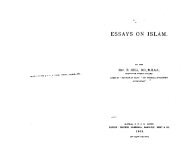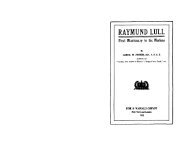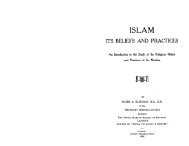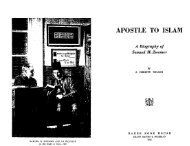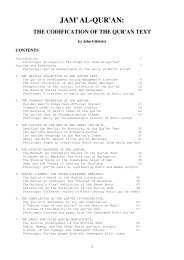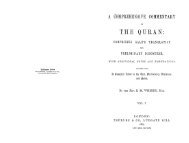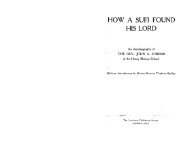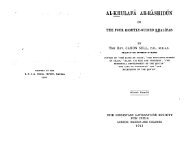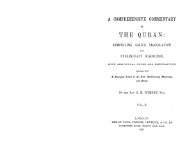Guillaume--Life of Muhammad.pdf - Radical Truth
Guillaume--Life of Muhammad.pdf - Radical Truth
Guillaume--Life of Muhammad.pdf - Radical Truth
Create successful ePaper yourself
Turn your PDF publications into a flip-book with our unique Google optimized e-Paper software.
xxxviii<br />
The <strong>Life</strong> <strong>of</strong> <strong>Muhammad</strong><br />
AI-Bukhiiri quoted him as an authority and Muslim cited him <strong>of</strong>ten.<br />
Abu'I-l;Iasan b. al-Qal\iin relegated him to the class 'good' (l;asan) because<br />
people disputed about him. As to the tradition from Falima, ~~-Khali~<br />
gave us an isniid running back through 1.1. and Fa\1ma to Asma d. Abu<br />
Bakr: 'I heard a woman questioning the prophet ·and saying, "I have a<br />
rival wife and I pretend to be satisfied with what my husband has n<strong>of</strong>in fact<br />
given me in order to anger her". He answered, "He who affects to be<br />
satisfied with what he has not been given is like one who dons two false<br />
garments".'1 Abii'l-I;Iasan said that this was the tradition from Fatima<br />
which injured I.I.'s reputation, so that her husband Hisham called him a<br />
liar. Malik followed him and others imitated them. However, there are<br />
other traditions on her authority.<br />
One cannot but admire the way in which I. Sayyidu'I-Nas discusses<br />
these attacks on.the credibility <strong>of</strong> our author. He goes at once to the root <strong>of</strong><br />
the matter and shows what little substance there is in them. Though, like<br />
the speakers he criticizes, he tacitly assumes that early writers ought to<br />
have furnished their traditions with isniids which would have met the<br />
rigorous demands <strong>of</strong> later generations who were famili~r witha ,;hole s~a<br />
<strong>of</strong> spurious traditions fathered on the prophet and h,s companIOns, hiS<br />
common sense and fairness would not let him acquiesce in the charge <strong>of</strong><br />
tadlis which, by omitting a link in the chain or by citing the original<br />
narrator without further ado, automatically invalidated a hadith in later<br />
days. Thus he said in effect that though I.I.'s traditions at times lack<br />
complete documentation there is no question <strong>of</strong> his truthfulness In t~e<br />
subject-matter he reports; and as to the charge <strong>of</strong> shi'ism and. qadante<br />
leanings, they are valid in another field altogether and have not~mg to do<br />
with the Sira. Again, what if Makki b. Ibrahim dId abandon h,s lectures<br />
when he heard him relate traditions about the divine attributes? Many <strong>of</strong><br />
the ancients failed to go the whole way when such problems were discussed,<br />
so what he says is <strong>of</strong> little significance.<br />
Yazid's story that the Madinans would not listen to traditions on I.I.'s<br />
authority does not amount to much because he does not tell us why, and so<br />
we can resort only to conjecture; and we have no right to impugn a true<br />
tradition because <strong>of</strong> what we think is a defect. We have already explained<br />
why Ya~ya al-Qallan would have none <strong>of</strong> him and called him liar on the<br />
authority <strong>of</strong> Wuhayb from Malik, and it is not improbable that he was the<br />
cause <strong>of</strong> the Medinans' attitude in the foregoing account.. A~mad b.<br />
l;Ianbal and I. al-Madini have adequately replied to Hisham's accusation.<br />
As to Numayr's accusation that he related false hadith on the authority<br />
<strong>of</strong> unknown persons, even if his trustworthiness and honesty were not a<br />
matter <strong>of</strong> tradition, suspicion would be divided between him and his<br />
informants; but as we know that he is trustworthy the charge lies against<br />
the persons unknown, not against him. Similar attacks have been made<br />
upon Sufyan al-Thauri and others whose hadith differ greatly in this way<br />
l<br />
Thia apin hal nothing to do with the Sira.<br />
Introduction<br />
x.xxix<br />
and what they base on unknown informants is to be rejected while that<br />
coming from known people is accepted. Sufyan b. 'Uyayna gave up Jarir<br />
aI-Ju'fi after he had heard more than a thousand traditions from him and<br />
yet he narrated traditions on his authority. Shu'ba related many tradi;ions<br />
from him and others who were stigmatized as 'weak'.<br />
As to A~mad's complaint that he recorded composite traditions without<br />
assigning the matter <strong>of</strong> them to the several contributors, their words<br />
agreed however many they were; and even if they did not yet the meaning<br />
was identical. There is a tradition that Wathila b. al-Asqa' said: 'If I give<br />
you the mea?ing <strong>of</strong> a tra~ition (not in the precise words that were used)<br />
that IS suffiCIent for you. Moreover, <strong>Muhammad</strong> b. Sirin said that he<br />
used to hear traditions from ten different people in ten different words with<br />
the same meaning. A~".'ad'~ complaint that 1.1. took othel' men's writings<br />
and Incorporated them m hIS own account cannot be regarded as serious<br />
until it can be proved that he had no licence to repeat them. One must look<br />
at the method <strong>of</strong> transmission: if the words do not plainly necessitate an<br />
oral communication, then the accusation <strong>of</strong> tad/is I lies. But we ought not to<br />
accept such a charge unless the words plainly imply that. If he expressly<br />
says that he heard people say something when in fact he did not, that is a<br />
downright lie and pure invention. It is quite wrong to say such a thing <strong>of</strong><br />
1.1. unless the w?rds leave no other choice.' When A~mad's son quoted<br />
h,S father as saymg that 1.1. was not to be regarded as an authority in<br />
legal matters though he saw how tolerant he was to non-legal matters which<br />
mak~ up the greater part <strong>of</strong> the Maghazi and the prophetic biography, he<br />
applied thIS adverse judgement on sunan to other matters. Such an extension<br />
is excluded by his truthful reputation.<br />
As to Yal.>ya's saying that he was trustworthy but not authoritative in<br />
legal matters, it is sufficient for us that he is pronounced trustworthy.<br />
If only men like al-'Umari and Malik were acceptable there would be<br />
precious few acceptable authorities! Yaha b. Sa'id probably blindly<br />
followed Malik because he heard from him what Hisham had said about<br />
1.1. His refu.sal to accept him as an authority in legal matters has already<br />
been dealt WIth under A~mad. Ya~ya made no distinction between them<br />
an.d ~ther traditions in the way <strong>of</strong> complete acceptance or downright<br />
reJectIon.<br />
Other attacks on his reputation rest on points that are not explained and<br />
for t?e ?,ost part the agents are unfair. Even in legal matters Abu 'Is a<br />
al-T,rm,dhi and Abu I;Iatim b.l;Iibban (d. 354) accepted him as an authority.<br />
The refutation <strong>of</strong> his opponents would not have been undertaken were<br />
it not for the favourable verdict and praise that the learned gave him.<br />
But for that a few <strong>of</strong> the charges would have sufficed to undermine his<br />
I Th~ mea,ning <strong>of</strong> ~his technical term is clear from the Context, W.'s falsche l'>,lame11<br />
untersch:eben IS not strIctly correct,<br />
z, The discussion <strong>of</strong> 1.l.'s dislike <strong>of</strong> al-Kalbi's traditions is· unimportant and is therefore<br />
omltted here.



